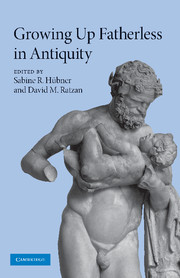Book contents
- Frontmatter
- Contents
- List of figures
- List of tables
- List of contributors
- Acknowledgments
- Note on abbreviations
- INTRODUCTION
- 1 Fatherless antiquity? Perspectives on “fatherlessness” in the ancient Mediterranean
- PART I COPING WITH DEMOGRAPHIC REALITIES
- PART II VIRTUAL FATHERLESSNESS
- 6 Bastardy and fatherlessness in ancient Greece
- 7 Fatherlessness and formal identification in Roman Egypt
- PART III ROLES WITHOUT MODELS
- PART IV RHETORIC OF LOSS
- Bibliography
- Index
6 - Bastardy and fatherlessness in ancient Greece
Published online by Cambridge University Press: 30 July 2009
- Frontmatter
- Contents
- List of figures
- List of tables
- List of contributors
- Acknowledgments
- Note on abbreviations
- INTRODUCTION
- 1 Fatherless antiquity? Perspectives on “fatherlessness” in the ancient Mediterranean
- PART I COPING WITH DEMOGRAPHIC REALITIES
- PART II VIRTUAL FATHERLESSNESS
- 6 Bastardy and fatherlessness in ancient Greece
- 7 Fatherlessness and formal identification in Roman Egypt
- PART III ROLES WITHOUT MODELS
- PART IV RHETORIC OF LOSS
- Bibliography
- Index
Summary
When Diogenes saw the son of a prostitute hurling stones into a crowd he admonished him with the words, “Watch out, young man, lest you wound your father, whom you clearly do not know.” To link the terms “bastardy” and “fatherlessness” in the modern West is to conjure up images of such children of unmarried lone mothers, with their biological fathers either unidentifiable or long gone. Children of this sort, who might be termed “mother's bastards,” presumably were to be found, albeit scarcely, across the broad span of the ancient Greek world, but we have little information about them. Almost all the bastards – the principal term in ancient Greek is nothos – that we do hear about, real or imaginary, are rather “father's bastards.” That is to say, it is in connection with their fathers that they are named and identified. We hear typically of “X, the bastard of father Y,” as opposed to “X, the bastard of mother Z.” This pattern of evidence might initially suggest that there is no place for a chapter on Greek bastardy in a volume devoted to fatherlessness, but place there is indeed, for despite bastards' connections, loose or tight, with their fathers, the concept of bastardy was nonetheless often strikingly imbued with the imagery of fatherlessness. In the first part of this study, we will look at the tendency of Classical Athenian culture to construct a legal, social, religious, and even physical distance between a father and his bastard child.
- Type
- Chapter
- Information
- Growing Up Fatherless in Antiquity , pp. 105 - 119Publisher: Cambridge University PressPrint publication year: 2009
- 4
- Cited by



